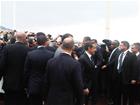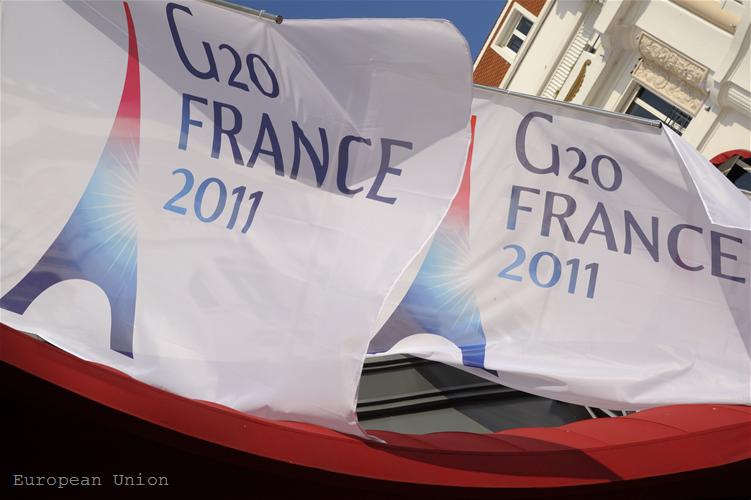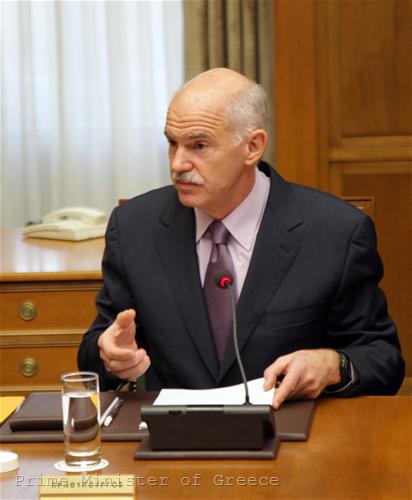Dark Clouds over the Cote D'Azur
Adelina Marini, November 3, 2011
 The G20 summit in the French resort of Cannes, famous with the annual gathering of showbiz stars, had to be a glorious moment for French President Nicolas Sarkozy, who is chairing the forum this year. The summit had to be the culmination of his two-year long efforts to play a leading role in the global agreement of, in his words, "the new global international monetary order". From the very beginning of his one-year presidency, however, the leading subject globally is the debt crisis in the eurozone. But on this subject too Mr Sarkozy managed to prepare himself to shine on the table of the 20 with a solution, hammered out in the early hours of October 27th by the euro area leaders, although the ownership is of the Merkozy tandem (Merkel and Sarkozy).
The G20 summit in the French resort of Cannes, famous with the annual gathering of showbiz stars, had to be a glorious moment for French President Nicolas Sarkozy, who is chairing the forum this year. The summit had to be the culmination of his two-year long efforts to play a leading role in the global agreement of, in his words, "the new global international monetary order". From the very beginning of his one-year presidency, however, the leading subject globally is the debt crisis in the eurozone. But on this subject too Mr Sarkozy managed to prepare himself to shine on the table of the 20 with a solution, hammered out in the early hours of October 27th by the euro area leaders, although the ownership is of the Merkozy tandem (Merkel and Sarkozy).
And, while probably Nicolas Sarkozy was thinking that he could pay more attention to his newborn daughter, as well as to have a look at the menu for the  official dinner, happened Greece. Greek PM Georgios Papandreou's decision, only a week after the key eurozone summit, to subject to a referendum the so painfully achieved agreements, in their part concerning Greece, threw in shock and awe Europe, the global financial markets and the G20 partners. Now the subject is no longer how the eurozone can be saved but what to do with Greece.
official dinner, happened Greece. Greek PM Georgios Papandreou's decision, only a week after the key eurozone summit, to subject to a referendum the so painfully achieved agreements, in their part concerning Greece, threw in shock and awe Europe, the global financial markets and the G20 partners. Now the subject is no longer how the eurozone can be saved but what to do with Greece.
This was the reason why on the eve of the summit on 3-4 November an urgent dinner was organised, dedicated to the euro area, where Mr Papandreou was directly posed the question - it is time for you to decide, can you hold on to the euro area tempo or not. The question which had to be asked long ago and which the Greek people will have to answer in the beginning of December.
How had the summit in Cannes to take place if itwas not for the Greek case?
In their joint letter as of October 30 the EU leaders, Jose Manuel Barroso and Herman Van Rompuy, explain in details what had been agreed for the eurozone rescue and to calm the financial markets. Beside that, they offer 8 priorities that the G20 has to come up with concrete results with in Cannes. The first is recovery of growth and tackling the economic imbalances, for which the two leaders propose an Action Plan to be drawn to address the short term challenges for the global economy.
 A reform of the financial markets is the second priority, according to misters Barroso and Van Rompuy, which the G20 has to deal with at this summit. Not all countries from the Group have started the legal process on implementing the Basel III agreement for bank regulation, as well as the regulation of the derivatives trade. The European leaders offer the third priority to be stabilising the international monetary system, which is in fact the main initial priority of France in her capacity of a president of the forum.
A reform of the financial markets is the second priority, according to misters Barroso and Van Rompuy, which the G20 has to deal with at this summit. Not all countries from the Group have started the legal process on implementing the Basel III agreement for bank regulation, as well as the regulation of the derivatives trade. The European leaders offer the third priority to be stabilising the international monetary system, which is in fact the main initial priority of France in her capacity of a president of the forum.
The presidents of the Commission and the Council think that the G20 can agree in Cannes on basic principles to facilitate the internationalisation of the currencies of key emerging markets. Obviously this is about China which has been insisting for a long time the renminbi to be recognised as a global reserve currency, although it is aware that it is still too early for that. The United States, in their part, are against that mainly because of the currency dispute with China. Washington insists the Chinese authorities to speed up the appreciation of the renminbi until it reaches a real market value, while Beijing thinks that its economic development is still vulnerable and needs artificially suppressed exchange rate. It is obvious that against the backdrop of the current events the two sides will put the weapons down for a while and focus on the imminent threat for their economies - the crisis in the eurozone.
The other priorities in general overlap with what was discussed at previous summits, like the social aspect of globalisation, unemployment, liberalisation of global trade in the framework of the negotiations round Doha, food security, climate change and energy challenges.
A musketeer spirit is indeed in Cannes
The moods in the otherwise sunny Cannes is too grim not only because of Greece or the eurozone. According to a map, drawn by The New York Times on the occasion of the euro area summit in end-October, most G20 members have serious troubles. From this map it becomes clear that the economic interconnectivity is so deep that it makes any rescue harder than ever. The most developed countries suffer from heavy debt burdens: the US 100% of their GDP, Japan 233% of GDP, Britain, France and Germany are around 80% and probably this is the reason why they feel a little bit more viable. Greece owes 166% of the size of its economy and Italy 121%. A big question mark is China, for which it is only known how much are his currency  reserves - over 3 trillion dollars, given his GDP is around 6 trillion, but not what is the indebtedness to it.
reserves - over 3 trillion dollars, given his GDP is around 6 trillion, but not what is the indebtedness to it.
The other countries from the group, especially those from the BRICS (Brazil, Russia, India, China, South Africa) have enough problems of their own, most of all domestic social problems, so they cannot afford giving away money to troubled big economies.
And all this against the backdrop of protests, growing into a global occupation movement; of dramatic transformations in countries rich of energy resources; and to a demographic growth that has hit 7bn people this week. This is why it will be very interesting to see the report about global governance, which will be presented in Cannes by British PM David Cameron, who is also demonstrating ambitions to recover at least a little bit of the brilliance of the British crown, but is facing a difficult dilemma - with or without the EU.
In the end of their letter to the G20 leaders Herman Van Rompuy and Jose Manuel Barroso write that the stakes for Cannes are high - for the credibility of the G20 and for each of its members. They hardly suspected then how these words reverberate against the background of what is to come after the Greek referendum. In order to make the summit more or less successful French President Nicolas Sarkozy will have to demonstrate musketeer spirit, which is not impossible for him, and to call on his G20 colleagues to shouttogether with him "One for all and all for one!".
 | © European Union
| © European Union | © Prime Minister of Greece
| © Prime Minister of Greece | © European Union
| © European Union